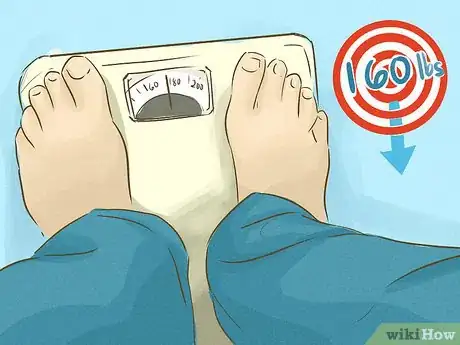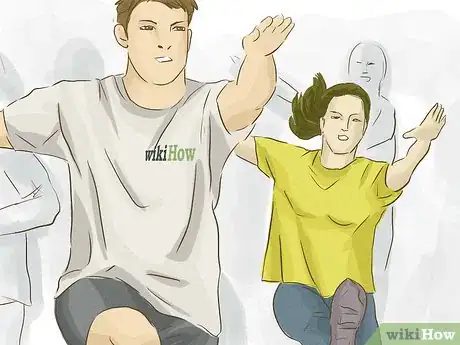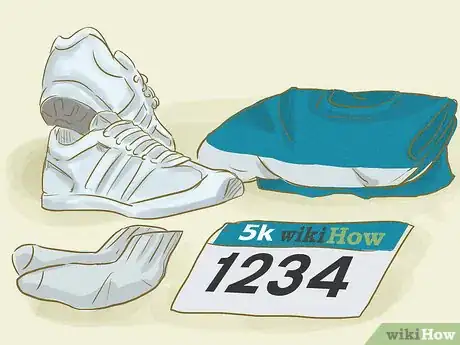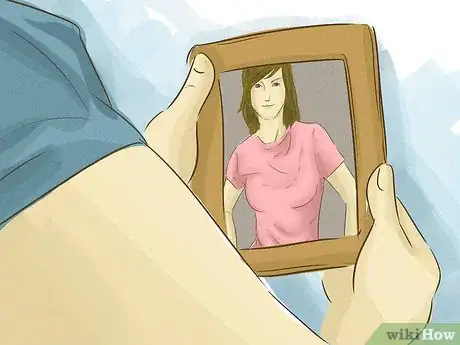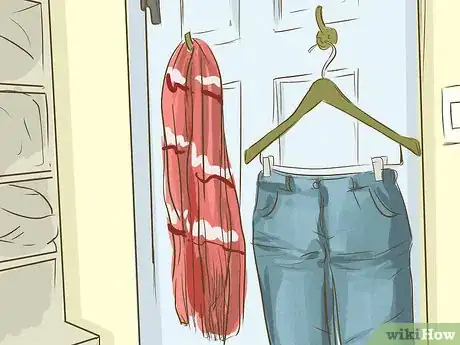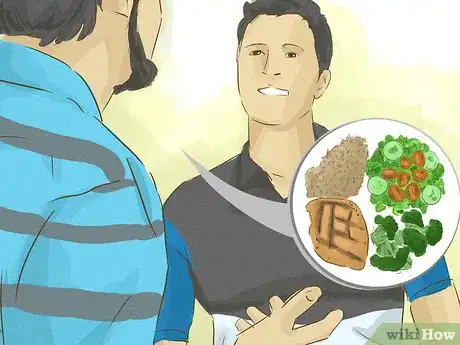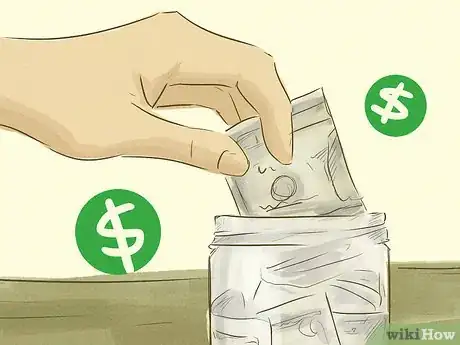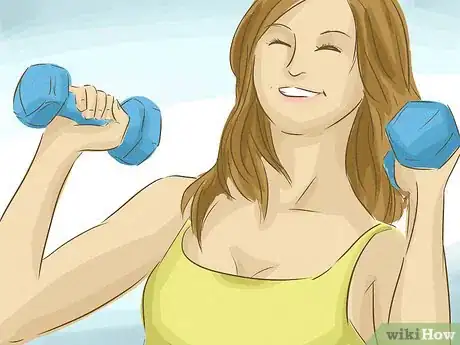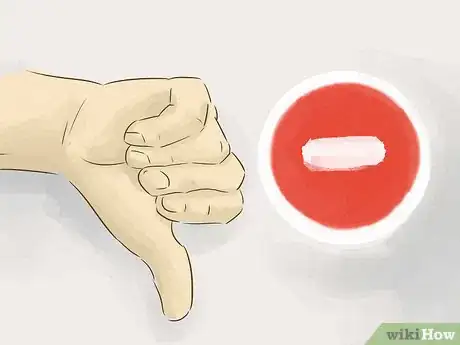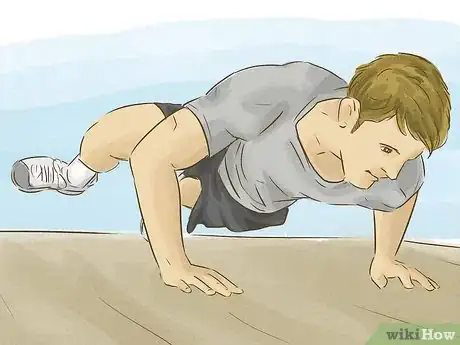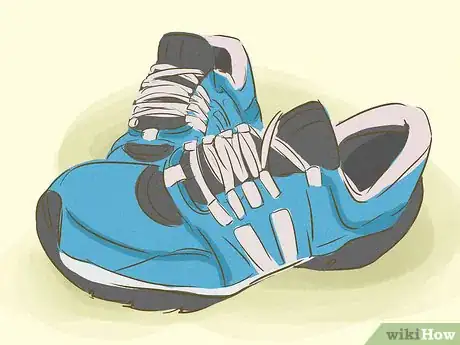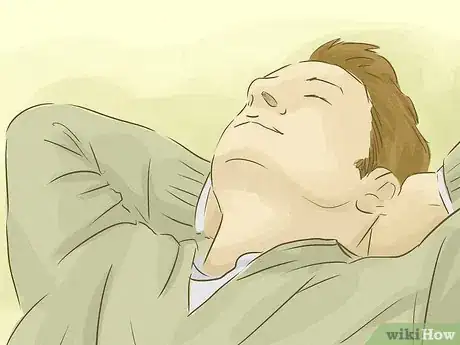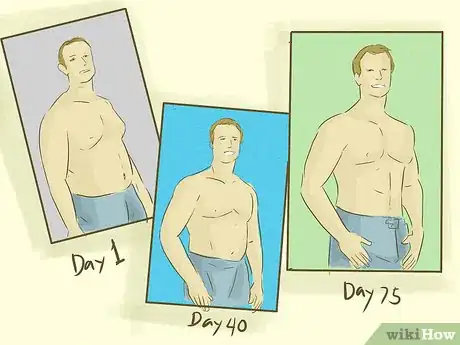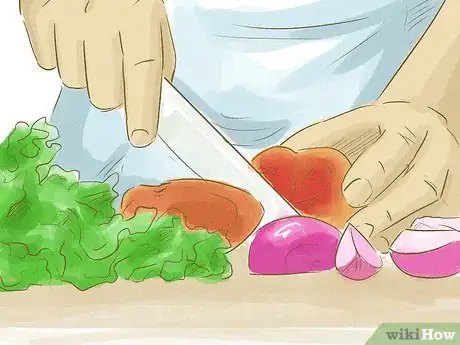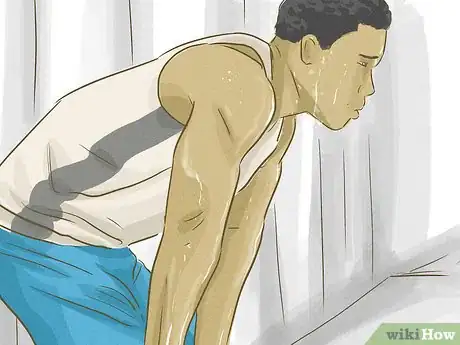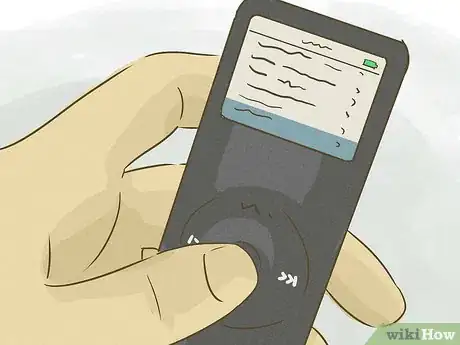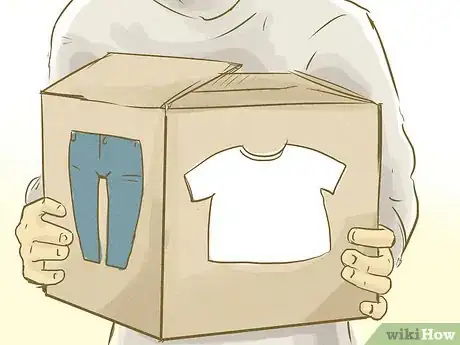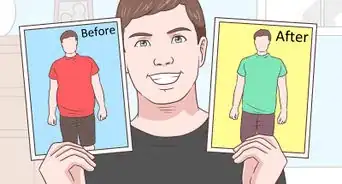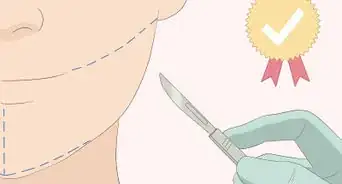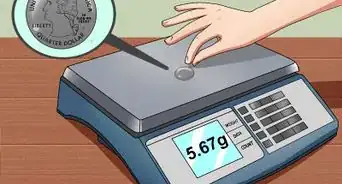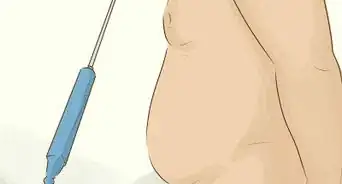This article was co-authored by Claudia Carberry, RD, MS. Claudia Carberry is a Registered Dietitian specializing in kidney transplants and counseling patients for weight loss at the University of Arkansas for Medical Sciences. She is a member of the Arkansas Academy of Nutrition and Dietetics. Claudia received her MS in Nutrition from the University of Tennessee Knoxville in 2010.
There are 11 references cited in this article, which can be found at the bottom of the page.
wikiHow marks an article as reader-approved once it receives enough positive feedback. This article received 17 testimonials and 92% of readers who voted found it helpful, earning it our reader-approved status.
This article has been viewed 871,264 times.
You promised yourself this time you mean it. For the next three days, you eat salads, jog, and nibble on protein bars. Then within a few days, you are the couch with a tub of Ben & Jerry's ice cream. It's time to throw it aside and get motivated. If you put your mind to it, you can avoid the yo-yo diet and turn it into a yo-u look awesome diet.
Steps
Starting a Motivating Routine
-
1Set a realistic goal. Saying, "I want to lose 50 pounds in the next couple of weeks" is just plain unrealistic. The weight did not go on that quickly, so it will not come off that quickly. If you set goals that you cannot possibly obtain, of course you will be discouraged.
- Consult a medical professional to determine what a sensible weekly or monthly goal should be. What is right for one person will be unhealthy for another, depending on your starting weight, age, activity level, gender, and so on.
- Consider getting a trainer (more on this later). When becoming more physically fit, it helps to know what you are capable of, and you simply may not know what is realistic and what is not. A good trainer can help you develop a goal and a plan to help you reach your potential.
- In general, the slower the weight comes off, the more likely it will stay off. A drastic weight loss will usually be interpreted by your body as a famine situation, creating a nasty cycle in which metabolism drops, you suffer physical discomfort, and generally you cannot keep it up.
- One pound is 3,500 calories. To lose a pound a week, you can cut 500 calories a day from your diet, burn an extra 500 calories a day through exercise, or some combination of the two.
-
2Find a weight loss partner. Finding a partner lets you tap into the power of teamwork. Having someone to cheer you on, be accountable to, and work out with will keep you more likely to stay on track.
- Ideally, have an individual with similar health goals. If you are a 45 year old woman trying to lose 40 pounds, you may be mismatched with your 21 year old co-worker who is trying to lose 10 pounds.
- You can find online weight loss partners, too. There are many online weight loss sites that help you pair up with a partner. This is especially helpful if you do not have a good person to choose in your social circle, or perhaps want to keep your weight loss private.
- Make sure you like your partner. If you do not like your partner, or he or she turns it into an unpleasant experience, you will be less motivated to continue.
- Depending on your regimen, this person should either aid you in eating better, working out more, or both. Even a grocery shopping buddy would help! Just make sure to choose someone who makes you feel better about the whole process – not someone who turns it into a competition.
Advertisement -
3Join a class. Whether or not you have a workout buddy, consider joining a class. You may pay for classes up front, which will motivate you to attend. Some even take attendance, which may cause some healthy guilt if you don't go. The best classes can feel like having thirty buddies and a coach.
- There are a lot of exercise classes available. No one type of exercise class is right for everyone, and there are more options than ever before. And feel free to look beyond the gym or fitness center. You could take lessons in horseback riding, skiing, or tai chi.
- Find a level that suits you. A good yoga studio, for example, may have workouts for seniors, serious athletes, pregnant women, beginning adults, parents with young children, and more.
- Consider learning a new skill. There is a vast world of physical skills out there to explore. While there is nothing wrong with just walking, some people like to learn something. This could be taking salsa lessons, karate, rock climbing, or belly dance.
-
4Start an exercise (b)log. Writing down your progress makes everything concrete. You can choose to write it down however you like, but we'll cover two forms:
- Start an exercise (and food) log. This is where you'll write down what you do every day, how many calories you've burned, how close you are to your goal, and the food choices you've made. If you have a buddy, share it with them for extra responsibility.
- Start an exercise blog. This will be published to the Internet world -- ultimate exposure (if anyone reads it, of course). With this, you take a more creative route, including all of the factors of an exercise log, but also how you feel about it, the obstacles you're facing, and how it feels to be making the progress. Just make sure you keep writing!
-
5Get a trainer. Don't have a friend that wouldn't either totally school you or encourage you to go to Starbucks instead? Well then, a trainer may be your best bet. Find one that jives with your personality though; one that makes you feel terrible will end up in you faking sick.
- Generally, any gym can provide you with a trainer. Hopefully, you can try out a couple introductory sessions for free. Ask around for those with a good reputation and only work with those that clearly know what they're doing and respect your weight loss goals.
- Some trainers offer a small group rate so you can go with a couple friends to save money.
-
6Sign up for a special athletic event. When you have an official "due date" on your fitness, it becomes a specific goal to work towards. Be sure it is something you would find enjoyable and appropriate to your physical abilities. Some examples:
- Participating at your local Relay for Life event.
- Running a 5K race.
- Able to go snorkeling on your vacation.
- Be able to hike the entire trail at a local park.
- Defeat an opponent in a fencing tournament.
- Ballroom dance at your son's wedding.
- Many training programs and apps are available to help you go from "Couch to 5K" by alternating walking and running. It's totally okay to take walking breaks! RunningintheUSA.com[1] and NextBib[2] offer comprehensive lists of runs in the USA. So no excuses; signing up is just a few button clicks away!
-
7Do not compare yourself to past versions of you. Posting pictures of yourself when you were younger, skinnier, more athletic, or whatever can ultimately be unmotivating. Even if you lose weight, you will not become that former version of you. Comparing yourself at age 50 to a teen version of you is unfair: teenagers typically have faster metabolisms, have not had children, as many health issues, and often have more "free time" to exercise. Instead try putting up images more reflective of what should motivate you and inspire you today:
- Pictures that you think you look good in recently. You do not have to look skinny, but looking happy, relaxed, silly, in a recital you are proud of--whatever makes you happy when you look at it. Feeling good at looking at yourself encourages you to take care of you.
- Photos of favorite places to be active: The tropical island you are hoping to kayak around, your favorite swimming beach, that picture of you at the finish line of the Fun Run.
- Photos of your friends, family, and other loved ones. You are taking care of you so you can take care and be with these people.
- Inspirational quotes. Whether it is a favorite Bible verse, a movie quote, or what someone wrote in your yearbook, inspiration can help move you forward.
-
8Toss out clothes that do not fit you. Some people make the mistake of trying to diet into a piece of clothing as a goal. Repeatedly trying on clothing that does not fit you can be unmotivating. Also, instead of choosing clothing that flatters you, you are trying to force clothing to determine how you feel about you--which can lead to you feeling poorly about your body. If you feel bad about your body, you may not take care of it as you should.
- The old idea is that if you constantly feel tight and pinched and uncomfortable in your clothes, it will be a constant reminder to keep to the diet plan. But being in discomfort is not usually inspiring. Usually what happens is a person feels miserable and ashamed, and more depressed about being overweight. This misery tends to lead to more overeating and not exercising. Instead of being inspired by clothing, clothing ends up being a source of misery.
- Another old idea is to have a clothing size as a weight-loss goal. However, clothing sizes are often not standard, especially for women. The cut of a garment can greatly affect the fit and look on a body. Also, there is always the possibility the dress size you had in high school is not a realistic goal as a 45 year old woman, for example.
- Feel free to give yourself a "fresh start" with clothing. Just get rid of all the clothes that do not fit or flatter your body at the present and buy a small number of outfits that look good on you now. While you lose weight sensibly, you will feel better about yourself now. Also, this will reflect an outlook of focusing on the present, one day at a time.
-
9Tell your family, roommates, and friends about your plans. Holding yourself accountable is often a key element of a health plan. When you feel that what you do will be communicated to others, you are more likely to make smart decisions. Also, those close to you can encourage you and help you on your way.
- You do not have to make yourself vulnerable to criticism, however. Some people may not be the best people to get involved with your health plans. It is OK to keep your plans only to people you feel comfortable with including in your plans. Sometimes there are people in our lives who are unsupportive, overly critical, or who should not be privy to your weight-loss program.
- Likewise, you may want to keep your plans to a select list of people. For example, posting what you ate during the day and your workout to Facebook can work as a sort of blogging. But does everyone on your friend's list want to get daily updates on what you ate for breakfast? Do you really want people at work to know how much you weigh? And if you skip Zumba class, will your sister make a snarky comment on that instead of saying something useful? It may be better to have a private list for this.
- Letting others know can help them plan accordingly. For instance, if you are on a diet and exercise plan, you can suggest for the beach weekend you would love to walk on the beach but avoid the ice cream parlor.
-
10Get into books, blogs, and success stories. Seeing that hundreds of others have gone through the same thing you have can be incredibly motivating. Some of their stories may even touch your heart. It can help to see that others have succeeded.
- Successful weight loss stories can be found all over the place. Try AuthenticallyEmmie.com[3] , Canyoustayfordinner.com[4] , and bloggingrunner.com[5] for starters. Especially if you do not have a lot of role models around you, it can be helpful to hear other people's stories. Not only will you be motivated, but these can be used as resources, too.
-
11Set up a reward system. However smart we think we are, all humans still respond to the same basic impulses. Set up the right reward system and your brain will be putty in your hands.
- Some like to devise a point system. For every good decision (be it food or exercise), you get a point. When you reach 100 points, treat yourself to something you'd enjoy (like a massage or a shopping trip). Don't reward yourself with unhealthy decisions, such as going to McDonald's or buying more sweets that are high in sugar! This will only undo your hard work.[6]
- Some like to bank their progress. Every time you have a good day, you put some money into a jar. That money goes to your reward, whatever it is.
- Your reward doesn't only have to be at the end! Set it for a certain amount of miles, a certain amount of calories cut or weight lost, or a certain amount of days you've gone without caving. Making them constant will keep them in sight.
-
12Spend time thinking positively. If your thought process solely consists of, "I'm so fat. I'll never make any progress" you risk living a self-fulfilling prophecy. When you start thinking positively, the idea of accomplishing something difficult becomes more believable because you feel better about yourself. You know you can do it. And you can.
- If positive thinking is particularly difficult for you (which is totally normal), set aside a few minutes every day to focus on it. When you start thinking negatively, stop and start over. What do you like about yourself? What do others say they like about you? What are you good at? Over time, this will become easier and easier, just like anything else.
Motivating Your Diet and Workout
-
1Pace yourself. It is usually better to start of a little easy, rather than taking on too much too soon. This is especially true if you have been relatively inactive for a while, or are older. Taking on too much too soon can hurt your body, causing injury and tanking your workout program. Only do what you can so your body can keep up.
- If you have not worked out in a while, start out small. Spend a week gauging your fitness level. When you have found what's easy and what's hard, start working your way up from there. Only increase by 10% each time to avoid wreaking havoc on yourself.
-
2Keep it fresh and fun. Maybe you've been running that same 5k three times a week and that last ten pounds you want to lose just is not coming off. You and your body might be becoming bored with your routine. Mix it up with some cross training, find a class you'd enjoy, or set a new specific exercise goal.
- The best way to lose weight is with cardio and weights.[7] If you have only been doing one or the other, this may be your problem.
- If you hate the exercise, it is not the workout for you. Running is great exercise, but if you hate running, do not run. If you hate doing what you're doing, you will not stick with it. Invest your time and energy into an activity you feel good while doing and it'll become a lifelong hobby.
- Change your routine routinely! Changing your routine every few months keeps boredom at bay and helps prevent damage from repetitive use.
- It also allows a program to follow the seasons. Running in the fall may be a pleasure, but maybe not so much in the depths of winter.
-
3Change the way you talk about your diet. Telling both yourself and other people that you don't eat certain things rather than you can't eat certain things has been shown to improve your ability to stick to your resolutions .
- Likewise, try to think of exercise as a part of your daily routine, rather than something you are obligated to do.
-
4Count your calories/miles/steps. If you're only going for weight loss, it's gonna be a drought of results for a while. Instead, consider looking at different numbers that you can see build up on the daily. After just one week of walking, you'll rake up tens of thousands of steps. That number is going to feel mighty impressive!
- This is where your (b)log comes in handy. Write everything down, and you'll soon be eager to see the numbers pile up. Can you imagine having ran 15 miles (24 km) this week, cutting 4,500 calories and clocking in 30,000 steps?[8]
- Don't know how to count your steps? Simple: Get a pedometer.
-
5Allow wiggle room. If your trip to the grocery store involves not making eye contact with the ice cream aisle, you're setting yourself up for disaster. A day is going to come when you decide to throw caution to the wind, abandon Jillian Michaels and decide Sara Lee is your new BFF. To avoid this day from looming on the horizon, allow yourself a bit of wiggle room.
- Denying yourself treats over and over again can make you feel deprived and sap your motivation. It's okay to eat unhealthy food once in a while. Try putting 1/4 of a normal portion on a plate, then savoring it slowly between drinks of water.
- The color blue is an appetite suppressant.[9] If you're having a little cheat, consider putting it on a blue plate.
-
6Turn off the negativity. It's easy to get super frustrated when it comes to weight loss. It never, ever, ever goes as fast and easily as we want it. You may feel like you've put in 120% for the last two weeks, get on the scale, and find that you've dropped half a pound. We've all been there, and it sucks. The easiest thing to do is get negative. Don't succumb to it! That's how you become unmotivated.
- Instead, concentrate on your progress. That log you've been keeping is beautiful. It's proof that you're on the right track. Go back to it and revisit your numbers. Set aside time to worry later. Right now it's time to make good decisions.
-
7Keep it short and sweet. Plenty of us make the excuse, "I just don't have the time," or "Working out is sooo boring!" Well, newsflash: High-intensity interval training can be done in minutes and burns tons of calories. The excuses just got schooled.
- To do this, all you have to do is do intense bouts of exercise between periods of rest. And saying you'll burn calories is an understatement -- they'll practically vanish in a glittery poof of air.[10] It can be done with anything, but a simple example is on the treadmill. Start walking for a few minutes, blast up to 90% of your maximum heart rate for 30 seconds, and then return to your walking speed for a minute. After that, go back to the super-intense level for 30 seconds.[11] Do this 8-10 times. And then? You're done.
- Consult a doctor before you try this regimen if you have even the slightest of health concerns. It is not for the faint of heart.
-
8Get some sweet gear. Starting running, going to the gym or taking a class is a lot easier if you have new stuff to try out. Get some new tennis shoes, new headphones, or just a new exercise outfit. Anything to keep the workout spicy!
Making Your Routine Stick
-
1Reward yourself. You know that reward system we talked about? Well, implement it. Implement it as often as you dang well please. No one said you can only reward yourself when you hit your long-term goal. How about the short-term? Set up small rewards, too, such as buying yourself a book or an accessory.
- It's usually a bad idea to use food as a reward. You can still have a treat once in a while, but building it into your reward system can promote unhealthy behavior patterns.
-
2Relax. Now that your body is a lot more active than it used to be, you're going to need ample time to relax. Take a bit of time out of your day for you. Take an extra long shower or shove in that power nap. It's well-deserved.
-
3Take pictures. When you're having a particularly hard time getting up and going, these pictures will be used to remind you of the work you've done. Take a picture of yourself at day 1 and subsequently every week. How is your body changing?
- Once your progress gets noticeable, you may want to consider posting these photos in your room or around your home. It'll keep it fresh in your mind that you've done all this work -- why sabotage it now?!
-
4Choose a new, healthy habit to add on. Just like how you should mix up your workout routine, as soon as you become an old pro at this healthy lifestyle thing, consider adding on a new habit. Try experimenting with a week of vegetarianism, taking a vitamin, or picking up an outdoorsy hobby. This new you, what might they like to do?
- If you're not already, start cooking. Not only will you be bettering the lives of your friends and family, but you'll gain a skill set and make healthy eating a lot more accessible.
-
5Get right back up when you fall. This should almost be higher up on the page. Know that you will have setbacks. This is inevitable and happens to everyone. The only thing you can do is get back up. If you miss a day of working out, that's better than missing two! Don't beat yourself up, just start fresh the next day.
- It's much harder to work up to a point than it is to fall back. Missing a week of working out could put you back to where you were two weeks ago. Keep this in mind when you're thinking about spending the morning in bed. What will the repercussions be in a few days?
-
6Keep a success journal. This sure involves a lot of writing, doesn't it? This doesn't necessarily have to be its own book -- this could be a section of your (b)log, too. Just make sure whatever it is you're writing has a portion dedicated to how awesome you're doing. It'll feel so good when you can add to it.
- When you feel like you haven't had a successful day, keep looking. What temptations did you pass up on that you could've given in to? Think about what you didn't do in addition to what you did do.
-
7Get a theme song or two. Rocky had his theme song (you caught that, right?) so why shouldn't you have yours? Everyone needs something to get them into the zone. What's your signature jam?
- Take the time to find 15 or so songs that really get you going. Having a playlist that amps you up in a matter of seconds will get your whole workout off on the right foot.
-
8Donate your "fat" clothes to charity. The time has come! That pair of pants is off the door, your goal weight is reached, and your old-you clothes are no longer of service. Donate them to charity in an act of altruism and hubris. Congratulations!
- You can donate your clothes to a worthwhile organization, but can you also donate your time and knowledge to others? You probably know at least half a dozen other people who are currently struggling through the same thing. How can you help?
Expert Q&A
-
QuestionI'm 13 and weigh 106 pounds and want to lose weight. What should I do?
 Claudia Carberry, RD, MSClaudia Carberry is a Registered Dietitian specializing in kidney transplants and counseling patients for weight loss at the University of Arkansas for Medical Sciences. She is a member of the Arkansas Academy of Nutrition and Dietetics. Claudia received her MS in Nutrition from the University of Tennessee Knoxville in 2010.
Claudia Carberry, RD, MSClaudia Carberry is a Registered Dietitian specializing in kidney transplants and counseling patients for weight loss at the University of Arkansas for Medical Sciences. She is a member of the Arkansas Academy of Nutrition and Dietetics. Claudia received her MS in Nutrition from the University of Tennessee Knoxville in 2010.
Master's Degree, Nutrition, University of Tennessee Knoxville Master's Degree, Nutrition, University of Tennessee KnoxvilleExpert AnswerDepending on your height, you may actually be at a good weight. Ask for help from your parents and make an appointment to see your doctor and dietitian to determine if and how you should lose weight.
Master's Degree, Nutrition, University of Tennessee KnoxvilleExpert AnswerDepending on your height, you may actually be at a good weight. Ask for help from your parents and make an appointment to see your doctor and dietitian to determine if and how you should lose weight. -
QuestionI'm 12 and I'm 198 pounds and I'm so ashamed of myself. I hate my body and I want to change but don't know how to since I'm only young.
 Claudia Carberry, RD, MSClaudia Carberry is a Registered Dietitian specializing in kidney transplants and counseling patients for weight loss at the University of Arkansas for Medical Sciences. She is a member of the Arkansas Academy of Nutrition and Dietetics. Claudia received her MS in Nutrition from the University of Tennessee Knoxville in 2010.
Claudia Carberry, RD, MSClaudia Carberry is a Registered Dietitian specializing in kidney transplants and counseling patients for weight loss at the University of Arkansas for Medical Sciences. She is a member of the Arkansas Academy of Nutrition and Dietetics. Claudia received her MS in Nutrition from the University of Tennessee Knoxville in 2010.
Master's Degree, Nutrition, University of Tennessee Knoxville Master's Degree, Nutrition, University of Tennessee KnoxvilleExpert AnswerThe good news is, you are probably still growing taller. Ask for help from your parents and make an appointment to see your doctor and dietitian. Instead of focusing on weight loss, focus on making healthy changes.
Master's Degree, Nutrition, University of Tennessee KnoxvilleExpert AnswerThe good news is, you are probably still growing taller. Ask for help from your parents and make an appointment to see your doctor and dietitian. Instead of focusing on weight loss, focus on making healthy changes. -
QuestionI'm 15 and I really want to lose weight to be ready for the summer, but every time I get motivated to cut off the sweets and work out I end up eating a lot more of them. What should I do?
 Claudia Carberry, RD, MSClaudia Carberry is a Registered Dietitian specializing in kidney transplants and counseling patients for weight loss at the University of Arkansas for Medical Sciences. She is a member of the Arkansas Academy of Nutrition and Dietetics. Claudia received her MS in Nutrition from the University of Tennessee Knoxville in 2010.
Claudia Carberry, RD, MSClaudia Carberry is a Registered Dietitian specializing in kidney transplants and counseling patients for weight loss at the University of Arkansas for Medical Sciences. She is a member of the Arkansas Academy of Nutrition and Dietetics. Claudia received her MS in Nutrition from the University of Tennessee Knoxville in 2010.
Master's Degree, Nutrition, University of Tennessee Knoxville Master's Degree, Nutrition, University of Tennessee KnoxvilleExpert AnswerLosing weight as a teen can be tricky. Ask for help from your parents and make an appointment to see your doctor and dietitian. Remember, everything is okay in moderation, even sweets!
Master's Degree, Nutrition, University of Tennessee KnoxvilleExpert AnswerLosing weight as a teen can be tricky. Ask for help from your parents and make an appointment to see your doctor and dietitian. Remember, everything is okay in moderation, even sweets!
Warnings
- Do not binge on sweets when you are feeling down or worn out! Stay strong. The mood will pass.⧼thumbs_response⧽
- Should you have any health concerns, first check with a doctor or health professional before engaging in any sudden changes in diet or fitness routine.⧼thumbs_response⧽
References
- ↑ http://www.runningintheusa.com/
- ↑ http://www.nextbib.com
- ↑ http://authenticallyemmie.com/about/
- ↑ http://www.canyoustayfordinner.com/
- ↑ http://www.bloggingrunner.com/
- ↑ http://thistimeimeanit.com/habits/excuses-motivate-lose-weight/
- ↑ http://www.washingtonpost.com/wp-dyn/content/article/2007/04/20/AR2007042001772.html
- ↑ http://www.thewalkingsite.com/10000steps.html
- ↑ http://www.huffingtonpost.com/2012/04/02/blue-sunglasses-weight-loss_n_1397364.html
About This Article
To get motivated to lose weight, sign up for a special athletic event, like a 5K race, to give yourself a “due date” for reaching your goal weight. You can also choose a specific athletic goal to work towards, like being able to hike the whole trail at your favorite park. Once you’ve decided on your goal, give yourself smaller goals, like walking or running a little bit each day, to make your big goal more manageable. To hold yourself accountable for your goal, look for a friend or family member to be your fitness partner. Having a partner is a great way to feel more responsibility to your goal because you will be supporting and motivating your buddy along the way. You can also start an online exercise blog or a private exercise journal where you write down the exercises you did, the calories you burned, the food you ate, and your reflections on your progress each day. This will make your progress more concrete and more rewarding as you go. For more tips from our Dietary co-author, like how to count calories and track exercise, keep reading!
